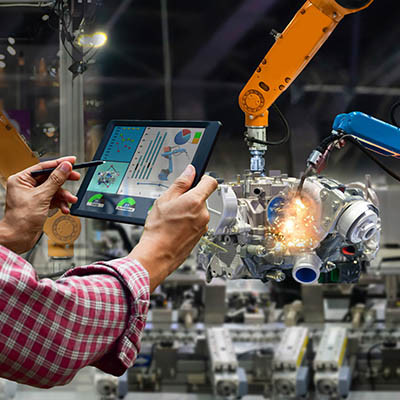
- Home
- About Us
- IT Services
- Understanding IT
- News & Events
- Blog
- Support
- Contact Us
- Register
- Login
Capstone Works Blog
Are Smart Devices Placing Texas Manufacturers at Risk?
Smart devices are more commonplace than ever before and while they are usually associated with voice assistants, fitness trackers, and home lighting systems; IoT smart devices have become crucial to industrial businesses and manufacturing. When it comes to manufacturing, these devices are known as IIoT, the Industrial Internet of Things. They help manufacturers be more efficient and productive, but they could also pose a risk if not properly implemented and managed.
What Is The IIoT (Industrial Internet of Things)?
IIoT technology operates in the same way your smart devices in your home do, acting as the middleman between your tasks and the machines that perform them. As such, the IIoT is an offshoot of IoT, the Internet of Things. The Internet of Things is the catch-all term used to describe internet-accessible “smart” devices that can control or be controlled by other Internet-accessible devices. An example of this would be using your smartphone to control the temperature of your thermostat or to monitor your home security system.
While the IoT is closely related to consumer electronics, the Industrial Internet of Things (IIoT) is linked to manufacturing and other industries. In the case of IIoT, examples of this would be using smart devices to monitor and automatically sense temperature changes which can affect production. Simply put, IIoT is about utilizing smart devices (machines) to capture, manipulate and move data efficiently, reliably, and at a reduced cost than having a human do it manually.
How Does the IIoT Benefit Manufacturers?
At a fundamental level the IIoT is designed to improve efficiency, and productivity, which ultimately can reduce overall business expenses. Previously, you might have needed to have team members drive to remote locations to monitor operations, or work throughout the night to manually ensure operations were performing as expected. The IIoT allows these tasks to be automated or done remotely, reducing the need for physical interventions .
Additionally, the IIoT reduces the need for your team to perform “busy work.” IIoT automation cuts down on human errors when it comes to recording information, such when collecting data. The IIoT and the connected smart devices not only increase accuracy, it can reduce or eliminate the need for your team to gather information or perform maintenance to equipment located in dangerous locations.
Finally, the IIoT brings with it an unprecedented ability for preemptive maintenance. As opposed to having your team physically check for issues which may need to be addressed and hoping that they catch them before they can fail, the IIoT allows your technology to communicate with each other and your team. For example, a team member can receive an alert on their smartphone notifying them of issues which can affect production. This can allow them to get a handle on minor problems before they can spiral into larger ones that can interfere with your manufacturing processes. The question is whether or not your business is ready for the Internet of Things.
IIoT and Smart Devices Can Be Targeted By Cybercriminals
While there are differences between the IoT and IIoT in scope, as one is designed for consumers and the other for industry, they both share the same fundamental weak point; a reliance on a stable and secure Internet connection, already essential for Austin businesses. As such, if your network becomes compromised, so can the applications and devices they are connected to. This is why it is essential that manufacturers follow best practices in regards to network and cybersecurity.
Here are five cybersecurity measures manufacturers should consider investing in to protect their use of the IIoT and their overall network:
- Maintain an asset inventory of all connected assets and devices
- Ensure all devices have unique credentials, authentication and access controls
- Don’t allow devices to fall out of firmware and software update compliance
- Encrypt all data your organization transmits
- Create a business continuity plan and recovery plan
IIoT devices are connected to the Internet 24/7, and as such, they face increased risk of being targeted by cybercriminals due to the sheer amount of time they are connected. Moreover, manufacturers face increased risk due to the services they provide to their communities and in the case of larger manufacturers, the nation. This makes them targets for ransomware attacks because the cybercriminals count on manufacturers feeling the pressure to keep their services up and running and will pay anything not to suffer a loss of productivity.
If a cyberattack or data breach happens to your business, there can be ripple effects, which can damage not only your business but also your partners who are connected to you.
Texas Manufacturers Should Take Advantage of Technology
If you’re a manufacturer, regardless of your industry, it’s time to embrace the advantages technology can bring to your operations. Technology can increase productivity, which reflects in your business' reduction in operating costs. When it comes to business technology, the IIoT is just the tip of the iceberg and managed IT can help your organization navigate the best technology for your business. Call Austin’s technology experts today at (512) 343-8891 and let us help your business take advantage of technology as opposed to it taking advantage of you.
About the author
Capstone Works, Inc. has been serving the Cedar Park area since 2001, providing IT Support such as technical helpdesk support, computer support, and consulting to small and medium-sized businesses.
Comments
Mobile? Grab this Article!
Tag Cloud
- You are here:
- Home /
- Blog /
- Capstone Works, Inc. /
- Are Smart Devices Placing Texas Manufacturers at Risk?
Latest News & Events
Account Login
Contact Us
Learn more about what Capstone Works can do for your business.
(512) 343-8891
715 Discovery Blvd
Suite 511
Cedar Park, Texas 78613
